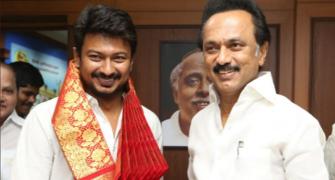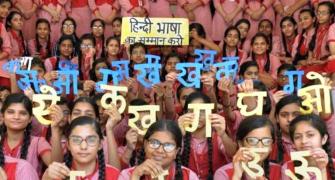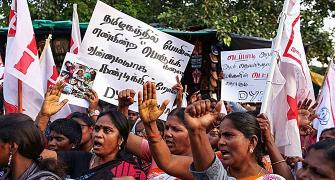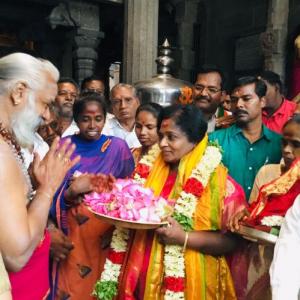'To them, the day may not be far off when the state BJP starts claiming and propagating that Modi is next only to AIADMK's late boss Jayalalithaa,' says N Sathiya Moorthy.

With reports that the golden sands of coastal Mahabalipuram may play host to the globally-watched Modi-Xi Jinping second informal summit next month, a section of the ruling All India Anna Dravida Munnetra Kazhagam second-line in southern Tamil Nadu in feeling increasingly uncomfortable, way ahead of the state assembly polls which are not due any time before May 2021.
Independent of the diplomatic success or failure of the summit, if finally held and in Mahabs, they fear that the BJP propaganda machinery elsewhere could be expected to package it as yet another feather in Modi's cap and his oneness of purpose, in asserting the Indian brand and inflexibility in the face of 'supreme national interests'.
In this context, they are also apprehensive even more of the re-doubled efforts of the BJP social media in Tamil Nadu in the aftermath of the complete washout in the otherwise sweeping success story of the BJP elsewhere across the country.
To them, the day may not be far off when the state BJP starts claiming and propagating that Modi is next only to AIADMK's late boss Jayalalithaa in self-confidence and self-sacrifice in the cause of a larger and greater social/national agenda.
However, they are equally confident/doubtful if the BJP could still reach out to GenNext voters in the state, who have not shown any favours to the Modi leadership, in two successive Lok Sabha polls, in 2014 and 2019.
If anything, in the two elections, the ruling AIADMK, under then chief minister Jayalalithaa (2014) and the anti-BJP DMK-led alliance (2019) won hands down.
Worse still, partnering with the BJP in 2019, the AIADMK suffered huge losses in terms of seats and vote-share, making their 2021 poll plans more tentative than already.
Indications are that the Opposition DMK may not be disinclined to continue with the Lok Sabha poll alliance for the assembly elections though there could well be a two-way shouting match and hard-bargaining for seat-sharing and seat-identification.
The AIADMK under Chief Minister Edappadi K Palaniswami and his deputy CM O Panneerselvam cannot play the same game with the BJP ally from the Lok Sabha polls, even if the rival DMK strikes a pre-poll alliance of the failed 1980 model, promising the latter's Congress partner of the time, a post-poll share in government.
First and foremost, the AIADMK is burdened by the failure in the Lok Sabha polls, which cadres and second-line leaders attribute to 'excessive identification' with the BJP-led NDA government at the Centre in general and the Modi leadership otherwise.
As they claim, for all this, the party did not even get a share in the government at the Centre under Modi 1.0, which may have helped the state in very many ways, for the AIADMK to 'market' the post-Jaya party to the voters and cadres alike.
Some of them venture even to argue that some AIADMK ministers at the Centre, if co-opted under Modi 1.0, might have out-shone their BJP, Shiv Sena and other counterparts, through better performance, given the poor output from that side.
The AIADMK's real problem with the BJP for any electoral alliance in 2021 owes to the party leadership's urgent need to re-establish contact with the grassroots on their own steam, in post-Jaya era, more so after the Lok Sabha poll losses.
If nothing else, cadres do not want the leadership to market Modi and the BJP to traditional and GenNext voters, at their own cost.
The current AIADMK second-line/cadre fears are that the AIADMK having been identified as being soft on Hindutva and at times as a soft Hindutva party, the BJP has come to be seen as a natural ally for some within the party and almost all in the BJP-RSS, both in the state and at the national-level.
They are not sure if working with the Modi-Amit Shah leadership of the BJP in the post-Jaya era, the AIADMK duo could draw the lines that are not to be crossed in the ideological re-definition of the Dravidian major and also excessive identification with the other.
They also point out, for the benefit of the BJP, that even if the latter hoped and succeeded in devouring the AIADMK (for argument's sake), even then the BJP vote-share would not jump up astronomically as hoped for by some Modi bhakts in Tamil Nadu.
To them, the AIADMK's is primarily a regional party vote-share. By wooing the AIADMK excessively, these sections point out, the BJP may only push traditional anti-DMK voters of the party into the waiting hands of new-generation pan-Tamil groups and parties, like that of Seeman, if not Kamal Hassan, whose confused identity may retain some of those voters who do not empathise with the other's pan-Tamil cause, but wanted to change the Dravidian status quo on the one hand and also keep the state still free of the BJP's hard-line Hindutva plank.
The prescription is for the BJP is to let the AIADMK, along with its regional allies, old and new, contest the assembly polls on its own, retaining the traditional 2 to 3 per cent vote-share, maybe driven up or down by Modi magic as may or may not exist in May 2021.
Their own reading, going by the BJP candidate's poor show in traditional strongholds like Nagercoil and Coimbatore in the Lok Sabha polls, is that the BJP in the state may have lost not gained since -- going possibly beyond the additional 5 to 7 per cent vote-share that the personal image of Atal Bihari Vajpayee and Modi had brought to the National Democratic Alliance even in Dravidian Tamil Nadu respectively in elections 1998 and 1999, and also elections 2014, not in 2019.
On issues as are being highlighted by the BJP, especially the party's social media in particular, and some of the leaders aspiring for the vacant position of state party chief, there are doubts about the ability of such campaigns to attract more Hindu votes than already.
They are not Hindutva votes, but broad-based Hindu votes, divided on castes. Unlike there is a religious divide, these caste-based votes, and educated sections thereof, would have no reason to move the BJP way, says poll strategists in both the DMK and the AIADMK.
In context, they also flag pan-Tamil issues like anti-Hindi posturing;, to which from time to time, concerns like NEET and jallikattu have added fresh meat, especially over the past five years or so.
As AIADMK sources point out, "In the absence of any strong inputs from regional parties like us from within the Modi government, the central leadership decided on such issues without reference to what local leaders with knowledge of ground realities, and with inputs only from their own yes-men in the state."
In this context, sources in the two Dravidian majors refer to the more recent BJP social media activists putting out a Hindi Diwas speech delivered by then Congress home minister P Chidambaram at the Centre, and seek viewers to compare it with what incumbent BJP counterpart Amit Shah has said on the occasion this year.
The language issue is deep-seated in the Tamil psyche, not only for what is visible, but in terms of the more complicated issues of federalism, which the Dravidian majors used to cherish until the present-day AIADMK rulers, who are not seen as being as MGR and Jayalalithaa, says an AIADMK leader.
Adds the DMK counterpart: "There is a vast difference that the Tamils have come to make out.... They see Chidambaram's Hindi Diwas speeches as routine and inconsequential. They did not see him in the mould of Sardar Patel, which the local BJP wants Amit Shah to be seen. PC was seen more of an economy man, unlike Amit Shah, whom even his party spin-doctors have promoted as a tough, go-getter. So whatever Amit Shah says will be seen only as conclusive, unlike in the case of PC or any other Congress leader after the days of the late K Kamaraj."
N Sathiya Moorthy, veteran journalist and political analyst, is Director, Observer Research Foundation, Chennai chapter.










